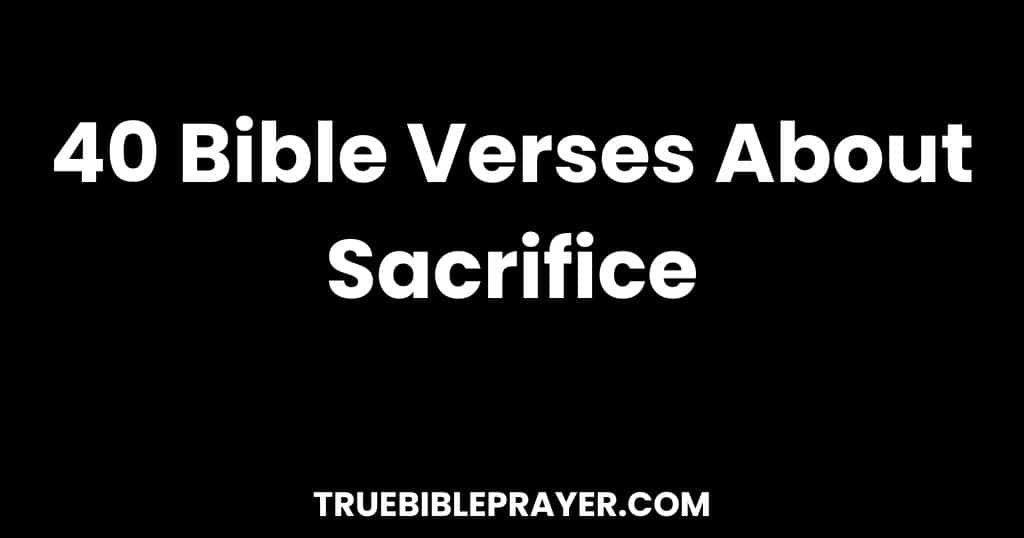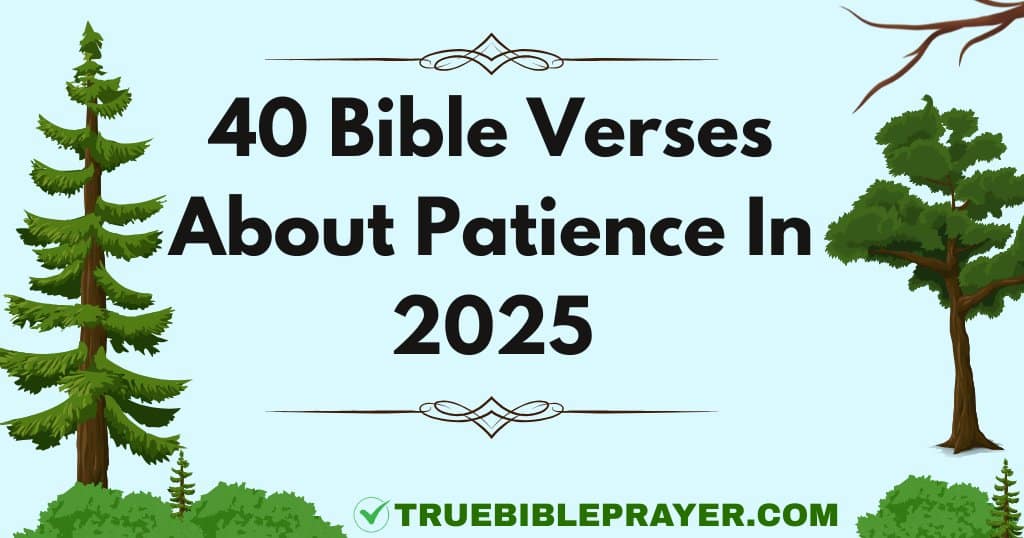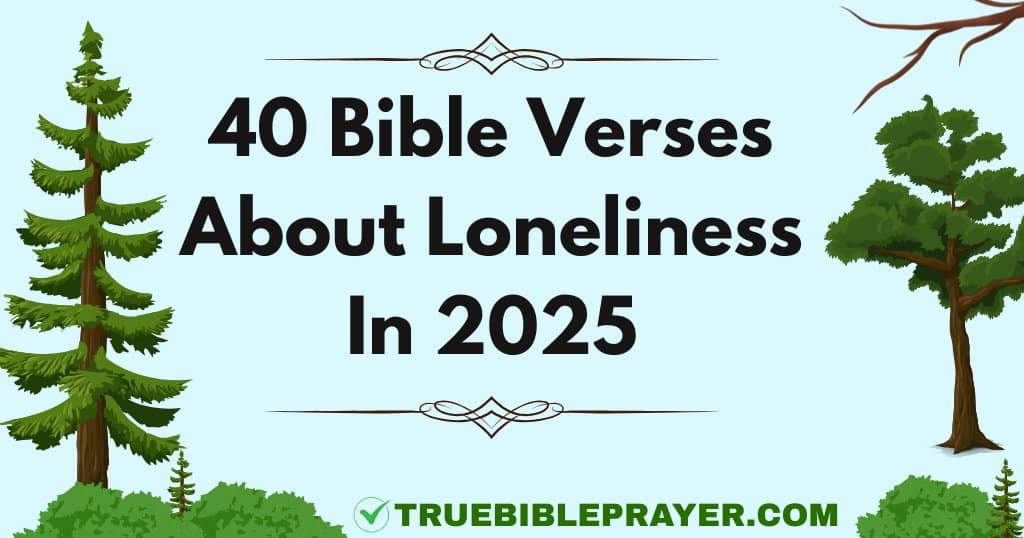Sacrifice can feel heavy when your heart is already carrying so much. You want to honor God, but some days it feels like you are giving more than you can handle. Maybe you are letting go of things others take for granted. Maybe you are choosing faith over comfort, truth over ease. I understand that tension. I have felt the weight of it too. That quiet place where your sacrifice is unseen but deeply personal. This is where the Bible speaks most clearly. Not to impress, but to guide. Not to burden, but to remind you that your sacrifice is not wasted.
Discover meaningful verses that reveal the heart behind giving, obedience, and devotion to God. This guide offers clear insights, real examples, and a carefully organized list to help you grow in faith.
what does the bible say about sacrifice
The Bible teaches that sacrifice is a powerful act of love and obedience. It begins in the Old Testament with animal offerings. These were not just rituals. They showed deep respect for God and trust in His promises.
In Genesis, Abel brought his best to God. His offering pleased God because it came from a pure heart. Later, the law of Moses introduced burnt offerings, grain offerings, and peace offerings. Each one had meaning. They were ways to say thank you, seek forgiveness, or restore a broken relationship with God.
But the Bible does not stop there. In the New Testament, everything changes. Jesus becomes the final and perfect sacrifice. His death on the cross replaces the old system. Hebrews says His sacrifice was once for all, bringing eternal redemption. No more animals. No more altars. Just grace.
God still calls for sacrifice today, but it looks different. Romans says to offer your body as a living sacrifice. That means living with purpose. Choosing what is right, even when it costs. Giving up pride. Serving with love. Trusting God when life feels uncertain.
Old Testament Sacrifices and Offerings
Genesis 4:4
“And Abel also brought an offering—fat portions from some of the firstborn of his flock. The Lord looked with favor on Abel and his offering.”
Description: Abel’s offering was chosen from the best he had — the fat portions of his firstborn animals.
Interpretation: True sacrifice involves giving the best, not what is left over. God honors the heart behind the offering more than the gift itself.
Genesis 8:20
“Then Noah built an altar to the Lord and, taking some of all the clean animals and clean birds, he sacrificed burnt offerings on it.”
Description: After the flood, Noah’s first act was worship through sacrifice.
Interpretation: Sacrifice shows thankfulness and reverence. When God delivers, we respond by offering what is pure and meaningful to Him.
Exodus 29:18
“Then burn the entire ram on the altar. It is a burnt offering to the Lord, a pleasing aroma, a food offering presented to the Lord.”
Description: This command was part of priestly consecration.
Interpretation: Sacrifice is not just about giving. It is about setting apart something entirely for God’s purpose. Obedience matters more than the ritual.
Leviticus 1:3
“If the offering is a burnt offering from the herd, you are to offer a male without defect. You must present it at the entrance to the tent of meeting so that it will be acceptable to the Lord.”
Description: God sets specific requirements for acceptable sacrifices.
Interpretation: Sacrifice must be intentional, pure, and without blemish. God sees beyond the act into the heart and integrity of the offerer.
Leviticus 17:11
“For the life of a creature is in the blood, and I have given it to you to make atonement for yourselves on the altar; it is the blood that makes atonement for one’s life.”
Description: Blood plays a central role in the sacrificial system.
Interpretation: Life is sacred. The shedding of blood in sacrifice points forward to Jesus, whose blood would one day bring final atonement.
Numbers 15:3
“And you present to the Lord food offerings from the herd or the flock, as an aroma pleasing to the Lord—whether burnt offerings or sacrifices, for special vows or freewill offerings or festival offerings—”
Description: Various types of offerings were made as acts of worship and devotion.
Interpretation: Sacrifice is not always about sin. It can be a joyful expression of love, celebration, or commitment to God.
Deuteronomy 12:27
“Offer your burnt offerings, the meat and the blood, on the altar of the Lord your God. The blood of your sacrifices must be poured beside the altar of the Lord your God, but you may eat the meat.”
Description: God provides instructions on how sacrifices should be carried out.
Interpretation: Obedience in the details matters. Sacrifice is both a spiritual and physical act of reverence before God.
1 Samuel 15:22
“But Samuel replied: ‘Does the Lord delight in burnt offerings and sacrifices as much as in obeying the Lord? To obey is better than sacrifice, and to heed is better than the fat of rams.’”
Description: Saul offered sacrifices but disobeyed God’s command.
Interpretation: Sacrifice without obedience is empty. God values the heart that listens and follows Him more than any outward act.
2 Chronicles 7:1
“When Solomon finished praying, fire came down from heaven and consumed the burnt offering and the sacrifices, and the glory of the Lord filled the temple.”
Description: God responds to Solomon’s worship with visible approval.
Interpretation: When sacrifices come from sincere worship, God’s presence becomes real. Sacrifice creates space for divine encounter.
Psalm 4:5
“Offer the sacrifices of the righteous and trust in the Lord.”
Description: The psalmist connects sacrifice with trust and righteousness.
Interpretation: Real sacrifice flows from a right heart. When we give with faith, our offering becomes a declaration of trust in God’s goodness.
Jesus Christ – The Ultimate Sacrifice
Isaiah 53:5
“But he was pierced for our transgressions, he was crushed for our iniquities; the punishment that brought us peace was on him, and by his wounds we are healed.”
Description: This prophetic verse speaks of the suffering servant, fulfilled in Jesus Christ.
Interpretation: Christ’s sacrifice was personal, painful, and purposeful. He bore what we deserved to offer us healing and peace.
John 1:29
“The next day John saw Jesus coming toward him and said, ‘Look, the Lamb of God, who takes away the sin of the world!’”
Description: John the Baptist publicly identifies Jesus as God’s sacrificial lamb.
Interpretation: Jesus is the fulfillment of every Old Testament sacrifice. His mission was to take away sin through a willing offering of Himself.
Matthew 26:28
“This is my blood of the covenant, which is poured out for many for the forgiveness of sins.”
Description: During the Last Supper, Jesus speaks of His coming death.
Interpretation: His sacrifice sealed a new covenant. It was not symbolic—it was real, deliberate, and meant to bring forgiveness.
Mark 10:45
“For even the Son of Man did not come to be served, but to serve, and to give his life as a ransom for many.”
Description: Jesus explains His purpose to His disciples.
Interpretation: True greatness is shown in sacrificial service. Christ gave His life to buy freedom for others, not to gain glory for Himself.
John 10:11
“I am the good shepherd. The good shepherd lays down his life for the sheep.”
Description: Jesus compares His care to that of a devoted shepherd.
Interpretation: His sacrifice was voluntary. He laid down His life with love and complete commitment to those He came to save.
Romans 5:8
“But God demonstrates his own love for us in this: While we were still sinners, Christ died for us.”
Description: Paul highlights God’s love through Jesus’ sacrifice.
Interpretation: We did not earn this gift. Christ’s death is the ultimate act of grace—a love shown when we were at our worst.
1 Corinthians 5:7
“Get rid of the old yeast, so that you may be a new unleavened batch—as you really are. For Christ, our Passover lamb, has been sacrificed.”
Description: Paul links Christ’s death to the Jewish Passover tradition.
Interpretation: Jesus is the Lamb whose blood covers and protects. His sacrifice delivers us from judgment and leads us into freedom.
Ephesians 5:2
“And walk in the way of love, just as Christ loved us and gave himself up for us as a fragrant offering and sacrifice to God.”
Description: Believers are called to reflect Christ’s sacrificial love.
Interpretation: Jesus’ life was not taken—it was given. His sacrifice pleased God and became a model for how we are to live and love.
Hebrews 9:26
“But he has appeared once for all at the culmination of the ages to do away with sin by the sacrifice of himself.”
Description: The book of Hebrews emphasizes the finality of Christ’s offering.
Interpretation: His sacrifice is not one of many. It is the one that ends all others, erasing sin completely and forever.
Hebrews 10:10
“And by that will, we have been made holy through the sacrifice of the body of Jesus Christ once for all.”
Description: Our holiness is rooted in a single, complete act.
Interpretation: Christ’s death set believers apart. There is no need to earn righteousness—His one sacrifice is fully enough.
Living Sacrifices in the Christian Life
Romans 12:1
“Therefore, I urge you, brothers and sisters, in view of God’s mercy, to offer your bodies as a living sacrifice, holy and pleasing to God—this is your true and proper worship.”
Description: Paul urges believers to live in a way that honors God daily.
Interpretation: Sacrifice is not just about death or ritual—it is about daily life, obedience, and a heart fully surrendered to God.
Philippians 2:17
“But even if I am being poured out like a drink offering on the sacrifice and service coming from your faith, I am glad and rejoice with all of you.”
Description: Paul describes his ministry as a personal offering.
Interpretation: Serving others and standing firm in faith may cost something. But when done for Christ, it becomes a joyful sacrifice.
2 Timothy 4:6
“For I am already being poured out like a drink offering, and the time for my departure is near.”
Description: Near the end of his life, Paul reflects on his faith journey.
Interpretation: A faithful life, poured out in service to God, is a worthy offering. Paul’s example encourages believers to finish strong.
Hebrews 13:16
“And do not forget to do good and to share with others, for with such sacrifices God is pleased.”
Description: Doing good and generosity are seen as sacrifices.
Interpretation: True worship includes action. God values kindness, compassion, and generosity as forms of spiritual offering.
1 Peter 2:5
“You also, like living stones, are being built into a spiritual house to be a holy priesthood, offering spiritual sacrifices acceptable to God through Jesus Christ.”
Description: Believers are called to a priestly role in offering spiritual sacrifices.
Interpretation: Sacrifice today means prayer, service, and worship. These are offerings that flow from faith in Christ.
Luke 9:23
“Then he said to them all: ‘Whoever wants to be my disciple must deny themselves and take up their cross daily and follow me.’”
Description: Jesus speaks clearly about the cost of discipleship.
Interpretation: Following Christ requires self-denial. Daily sacrifice means choosing His way over our own, even when it hurts.
Matthew 16:24
“Then Jesus said to his disciples, ‘Whoever wants to be my disciple must deny themselves and take up their cross and follow me.’”
Description: A direct call to commitment and surrender.
Interpretation: Sacrifice is not optional for disciples—it is central. True love for Christ is shown through daily surrender and obedience.
Colossians 3:17
“And whatever you do, whether in word or deed, do it all in the name of the Lord Jesus, giving thanks to God the Father through him.”
Description: Every action becomes a chance to honor God.
Interpretation: A life lived with purpose and gratitude is a living sacrifice. Our work, words, and attitude can become worship.
Galatians 2:20
“I have been crucified with Christ and I no longer live, but Christ lives in me. The life I now live in the body, I live by faith in the Son of God, who loved me and gave himself for me.”
Description: Paul describes the transformation that comes through faith.
Interpretation: Sacrifice means dying to self and living for Christ. His life becomes our life, reshaping every thought and choice.
2 Corinthians 5:15
“And he died for all, that those who live should no longer live for themselves but for him who died for them and was raised again.”
Description: Christ’s death redefines the purpose of our lives.
Interpretation: Sacrifice is not just an act—it is a mindset. We live for Him who gave everything for us.
The Heart Behind the Sacrifice
Proverbs 21:3
“To do what is right and just is more acceptable to the Lord than sacrifice.”
Description: This verse contrasts external offerings with moral integrity.
Interpretation: God values righteousness over ritual. A life of honesty and justice pleases Him more than empty religious acts.
Psalm 51:17
“My sacrifice, O God, is a broken spirit; a broken and contrite heart you, God, will not despise.”
Description: David speaks after his deep failure and repentance.
Interpretation: True sacrifice starts within. God responds to humility, not performance. A soft heart matters more than any outward gift.
Hosea 6:6
“For I desire mercy, not sacrifice, and acknowledgment of God rather than burnt offerings.”
Description: God rebukes hollow ritual without real devotion.
Interpretation: Mercy and relationship come before religion. God wants love and awareness of Him more than routine offerings.
Micah 6:6-8
“With what shall I come before the Lord and bow down before the exalted God? Shall I come with burnt offerings, with calves a year old? … He has shown you, O mortal, what is good. And what does the Lord require of you? To act justly and to love mercy and to walk humbly with your God.”
Description: The prophet answers what truly pleases God.
Interpretation: Sacrifice without justice, love, and humility misses the point. God’s will is not mystery—it is a way of life.
Ecclesiastes 5:1
“Guard your steps when you go to the house of God. Go near to listen rather than to offer the sacrifice of fools, who do not know that they do wrong.”
Description: Worship without thought can become foolish.
Interpretation: Listening to God is a form of sacrifice. Mindless giving or ritual without reflection is not honored by Him.
Isaiah 1:11
“The multitude of your sacrifices—what are they to me?” says the Lord. “I have more than enough of burnt offerings… I have no pleasure in the blood of bulls and lambs and goats.”
Description: God rebukes Israel’s hollow religious system.
Interpretation: Sacrifices lose value when the heart is distant. God wants devotion, not routine. True worship starts in the soul.
Amos 5:22
“Even though you bring me burnt offerings and grain offerings, I will not accept them. Though you bring choice fellowship offerings, I will have no regard for them.”
Description: God rejects worship from a corrupt people.
Interpretation: Sacrifice means little without justice and righteousness. God looks past the altar and into the life behind it.
Malachi 1:10
“Oh, that one of you would shut the temple doors, so that you would not light useless fires on my altar! I am not pleased with you,” says the Lord Almighty, “and I will accept no offering from your hands.”
Description: The people were offering dishonorable sacrifices.
Interpretation: God would rather stop worship than accept dishonesty. He wants offerings that reflect purity and reverence.
Matthew 9:13
“But go and learn what this means: ‘I desire mercy, not sacrifice.’ For I have not come to call the righteous, but sinners.”
Description: Jesus challenges the Pharisees’ view of holiness.
Interpretation: Mercy is a higher calling than ritual. Christ came to rescue broken people, not to build religious systems.
1 Samuel 16:7
“But the Lord said to Samuel, ‘Do not consider his appearance or his height… The Lord does not look at the things people look at. People look at the outward appearance, but the Lord looks at the heart.’”
Description: God speaks as Samuel chooses David.
Interpretation: Sacrifice without sincerity is empty. God always sees the heart, and it is the heart that determines the worth of any offering.
Conclusion
Sacrifice in the Bible is not just about giving something up. It is about love, obedience, and drawing closer to God. From the early offerings of Abel and Noah to the perfect sacrifice of Jesus Christ, Scripture shows that true sacrifice flows from a willing and humble heart. You have now seen how God values both the act and the intention behind it.
This article brought together verses that reveal what sacrifice truly means, how it has shaped the faith journey, and how it still matters in daily life. Whether you were looking for understanding, direction, or encouragement, these verses helped connect your questions to clear, trusted answers.




